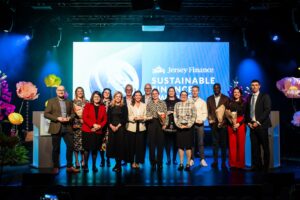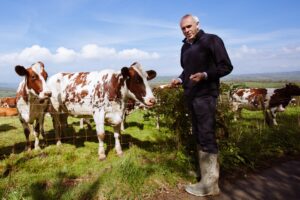
The theme of the conference was ‘Farming Matters’. What follows is an edited version of the speech by the Minister for Sustainable Economic Development, Deputy Kirsten Morel, who has the political responsibility for agriculture
‘The fact that today’s conference has been fully subscribed I think demonstrates just how important this industry is to our Island.
This is the third opportunity I have had to address this conference as Minister with responsibility for the Island’s rural economy and I’ve been reflecting on the changes we have witnessed over those last three years and consider how we [as Government] (and especially my Department) are helping the farming sector adapt to change and meet the inevitable challenges of the future.
Farming remains an intrinsic part of Jersey’s identity. It has shaped not only our beautiful countryside and landscape but also our island’s heritage, its culture and its international identity.
The Jersey dairy cow is iconic and known the world over. The RJA&HS say it is the second most populus breed of dairy cow on the planet – a remarkable achievement given the size of our Island.
The dairy sector is an excellent example of how a well organised cooperative approach can deliver fantastic products for Island consumers, while developing value-added exports which bring financial viability and add to Jersey’s reputation for the highest quality standards.
The Jersey Royal new potato remains one of Britain’s most famous seasonal products, and is now recognised under the British ‘Geographical Indication’ protection scheme.
Our Island growers maintain cultivation traditions which span almost 150 years of continuous production – a story which helps to promote our sustainability and to fly the flag for Jersey produce more widely in every major UK retailer. This is testament to the skills and resilience of those engaged in this trade.
Our Island farming system is, however, built on more than just milk and potatoes. Whilst they remain the key economic factors of production, diversity is an extremely important ingredient for a sustainable and resilient farming and food system.
All contributions to this system are valued – values which are increasingly recognised by Government and rewarded directly under the credit based Rural Support Scheme.
I am delighted to confirm that in 2024 more than 80 rural businesses were active on the RSS… that’s more than double the number who were on the scheme four years ago.
Every business plays a vital role in ensuring we have a robust and viable rural economy, regardless of the size of the business or the particular niche in which they operate.
I stood here only two years ago and admitted that – despite farming’s historic significance to our island and the enormous value it brings – there had been a steady reduction in government support for farming over recent decades.
Successive governments had drawn down Jersey’s support for agriculture at the same time as neighbouring jurisdictions had increased their own.
As a result, the sector had been competing on an unlevel playing field and the pressures this brought had reached a peak.
At the time I said that this was a trend we had to reverse if we expected to maintain a sustainable rural economy and preserve not only this industry but also the Island we knew for future generations…
Two years on, I am pleased to say that we have managed to successfully reverse the trend.
This has been achieved by a combination of factors, not least of which has been the strength of our democratic process. Members of our States Assembly voted last year to support increased spending on both the Rural and Marine Support Schemes.
You may recall that not one single member of the States Assembly voted against the proposition. That clearly demonstrated that support for farmers and fishermen is a priority for States Members – and I am pleased that this is now being delivered in actions rather than mere words.
In April 2022, as Assistant Minister, I was pleased to present the Economic Framework for the Rural Environment, a strategy which provided a foundation to help deliver additional government funding towards our agricultural sector as well as a longer-term vision of increasing sustainability.
In November 2022, as Minister, I pledged to build upon this and direct renewed government focus towards this important sector and support businesses across our entire rural economy.
As a result, the government’s total support for this sector grew to over £3million in 2023, for the first time in over a decade.
This budget growth was delivered via our innovative ‘credit’ based support scheme – a game changing piece of rural policy development which really does enable the delivery of public money for public goods, as we reward those who deliver rural services with an open, accessible, accountable and fair value system.
In 2024, thanks to the vote of the States Assembly, our increased budget has enabled us to deliver over £6million in rural support for the first time in over twenty years.
There are those who may question the wisdom of sustaining an agricultural sector in a manner which is seemingly entirely dependent on the financial interventions of Government.
Well, let’s think for a moment about dependencies. It may just be that the majority of our population have dependencies – the principal one being a dependency on farmers – so that they have food to put on the table three times a day.
For the most part, the food consumed by our community arrives by ferry twice a day and is produced by other communities, many of whom have continued to make significant investment into their food systems.
As a community we are not only therefore dependent on farmers, but dependent upon the financial interventions made by other Governments and societies. £2.4 billion pounds in England next year for example. Over 60 billion euros in the EU. This is the reality of our food system.
Our expectation that we are entitled to cheap abundant food belies a reality … the reality that this comes at a cost.
It is only right that our community bears a fair share of that cost – especially if we are to maintain a progressive and sustainable agricultural and food system, which feeds our people, provides meaningful employment and cares for our environment in a manner which our grandchildren will appreciate.
I am firmly of the opinion that if we do not invest in our farming and fishing industries as a society, those industries will not be able to compete and will disappear from Island life. We have come precariously close.
Two years ago I remarked that it is was not too late for government to step up its support for agriculture but we could not leave it any later.
We have stepped up. We have transformed our policies, budget and the way funding is delivered. We have made and are making a difference … but there is much yet to do.
Food resilience, the living wage, our carbon footprint, climate change are all immediate concerns. So, what are we currently doing about these issues?
Firstly, we are working together – the Rural Forum has been meeting to provide a regular opportunity for industry and government to discuss and agree a collaborative approach to addressing the key issues of the day.
During 2024 we have also commissioned Hypha to undertake a Food Resilience Report (which you will hear more about later today). This has given us more evidence to underpin our activities into 2025.
During the first part of next year we will review the content of our Economic Framework for the Rural Environment and update the policy document to ensure we have the right set of information and tools to deal with contemporary issues.
We are also ready to deliver a revitalised Agricultural Loans Fund. Paul Murphy will be presenting later today on the details of how to access this fund (which will be via Jersey Business) so I won’t comment too much on the way the fund will operate but do need to explain that its reintroduction has not been a straightforward process.
It has necessitated changes to the Regulations, which needed go through the Government process … law drafting, lodging for debate and a subsequent States Assembly approval for the changes.
These were passed on 10th September and a new Loans Board met (for the first time since 2003) on the 25th September – initially to approve the revised Loan Application process.
For those who may have expressed some frustration at the length of time this has taken, I can assure you that we have progressed this matter as fast as reasonably possible – especially considering the disruption caused by a change of Government at the start of the year.
We have sufficient money in the fund now and the current budget proposal, due to be debated next month, ensures we will have the £10million fund established and accessible into the future.
The living wage is another issue which many of you will be concerned about and I am pleased to confirm that over the next two years the Government will be introducing a programme to enable businesses to transition to the living wage. Specifically, this will increase levels of support to the Rural and Marine sectors by £1.1million for each of the next two years.
This will be delivered via our existing Rural Support Scheme as enhanced credits for staff and additional funding for investment projects which may improve productivity.
The flexibility of our Rural Support Scheme credit matrix allows us to target those businesses most impacted by the proposed increase in the Minimum Wage and I would like to reassure you that we will do everything we can to ensure the impact of the increase is not detrimental to the rural and marine economies.
This new package is one part of a much bigger plan – one that is aimed helping ALL island businesses to become better.
In total, the package is worth £20 million over two years.
In addition to the rural and marine top up I’ve just mentioned, there are grants to enable employers to invest in their staff and in themselves with the aim of improving their productivity.
There will also be grants aimed at the visitor economy sector, and employee support for lower-income workers who have lived in Jersey for less than five years.
In addition that package – and the agricultural loans fund – there is another initiative being launched today by Impact Jersey, offering grants to developers to create tech-driven solutions which will enhance the local retail and visitor experience.
These initiatives all have a shared goal.
We want to help Jersey businesses to invest in themselves.
At the moment, Jersey suffers from low levels of business investment. Jersey’s investment level is less than half of the UK’s. And the UK’s is the lowest level of any G7 nations.
If we are going to achieve our ambition of becoming a high performing, environmentally sustainable and technologically advanced small island economy by 2040, we have to invest in change.
I want you to know that in me you have an advocate who will champion agriculture in the States and around the Council of Minister’s table. I cannot and will not be complacent.
When I look at farming in Jersey, I see an ancient industry that has constantly reinvented itself and moved with the times. It is a sector that has innovated, changed and improved to the extent that it provides every single islander with value, regardless of whether they buy local produce or not.
That value can be seen in every well-maintained hedgerow, in every financial services advert that features a Jersey cow, in every UK TV show that highlights Jersey Royals or indeed, every American farmer who is staggered by the work of the Jersey herd in less developed countries. We all gain from the work that you do and finally, that is being recognised.
It is time for Government to step up and back you to the hilt because your future success is also Jersey’s future success.




